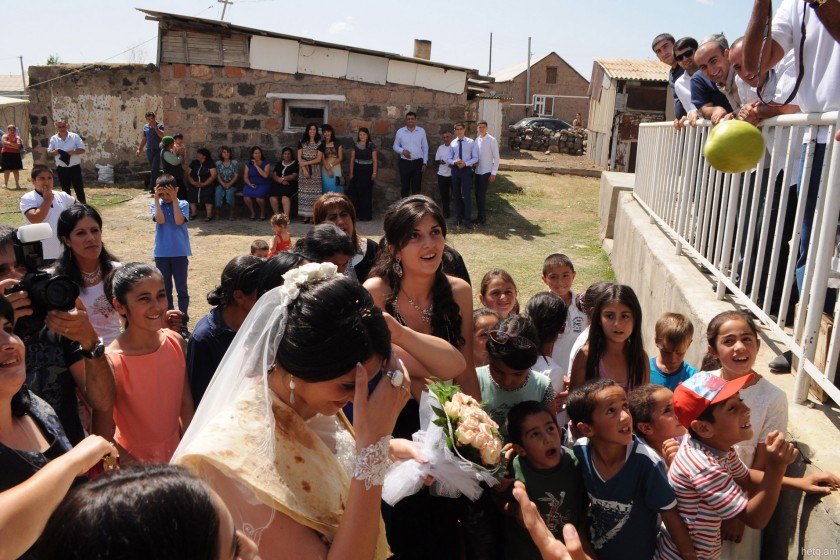
A Yezidi Wedding in Armenia: Groom Hits the Bride with an Apple to Make Her Obey
By Maneh Grigoryan
It’s the first day of a Yezidi wedding in the village of Alagyaz in Armenia. Seven lambs have been sacrificed.
A tree is adorned with legumes and fruit. Later on, according to tradition, it will be brought to the home of the groom by the bachelor brother through the streets. Neighbors meeting him along the way offer money to assist him in paying the wedding expenses. For example, he must purchase a pillow at the bride’s house symbolizing unity. On the day of the wedding, he must shake the tree on the bride’s head.
Despite the commotion, the groom’s aunt finds the time to explain their traditions to us.

In the old days weddings were arranged by the parents. Today, it’s enough for a boy and girl to like one another. But the role of the parents remains in any case. They are young, emotional and full of energy. They can be deceived in many issues. Especially today, when girls deceive the boys. There are few who are pure and love one another sincerely. 70% marry with money and position in mind. Prior to the wedding there is a grand betrothal with expensive gifts. Later, they decide on the wedding day. In the past, a person would play the role of a fox. He’d run and tell the bride’s family that the groom’s party was approaching. They would sprinkle water on those arriving as a sign of bounty. According to the old ways, the boy’s relatives would arrive by wagon to bring the bride. Now, they come in limousines. From the boy’s side a person, let’s say the bachelor brother, would have to purchase a pillow from the house of the bride’s father. He’d then give the pillow as a gift to the groom so that the newlyweds would grow old on the one pillow,” Zina tells us.

Zina confesses that many of the old traditions have disappeared with the passage of time. Today, Yezidi brides walk around with their heads uncovered. At one time the bride’s head was wrapped in a seven colored scarf. The colors were said to resemble the tail of the peacock so revered by the Yezidis.

Zina then explains the meaning of the three apples thrown in the direction of the bride. “Why the three apples? Because Adam told Eve not to eat the apple three times. ‘We must live a long time’, he said. But Eve didn’t listen to him and ate the apple, causing misfortune. The groom hits the bride with an apple so that she will obey him. He scares the bride into not repeating the story of Adam and Eve.

Zina says that her wedding was more in line with Yezidi tradition. Her husband tells us that he had to pay 2,200 rubles as a bounty (ghalim).
The two lament the fact that the significance of the old ways is growing weaker year by year. Zina’s husband says that when his grandson gets married he will keep Russian and Armenian influences at bay.

Regarding mixed marriages, Zina says that they have become frequenter with time and that this has led to a weakening of Yezidi identity; i.e. assimilation. Mixed marriages were unacceptable at one time.
Tradition states that a bride must not speak to her mother-in-law and has no right to raise her voice to her elders. She also cannot sit at a table with men. Things are different today, Zina says.
 Asking for the hand of a village girl is a lengthy process. First, the boy’s parents visit the house of the girl. Her father then asks her to fetch some water and serve the guests. If the boy’s parents (and the boy) like the girl they come back to the house a second or a third time to ask for her hand. If an agreement is reached, the betrothal takes place. Only after can the couple meet.
Asking for the hand of a village girl is a lengthy process. First, the boy’s parents visit the house of the girl. Her father then asks her to fetch some water and serve the guests. If the boy’s parents (and the boy) like the girl they come back to the house a second or a third time to ask for her hand. If an agreement is reached, the betrothal takes place. Only after can the couple meet.

The dowry is of important significance in the wedding ritual and Yezidi culture in general. It is displayed in full so that all can see what the girl’s family has given. Wool bedding must be part of the dowry.

On the day of the wedding, the couple dips their hands into a jar full of henna. The couple then goes around with the jar on a tray. Each of the guests dips their fingers and then place money on the tray.

We should also note that the bride is taken from home when the sun is at its zenith. It all has to do with the Yezidis’ reverence for the sun.

The groom’s aunt explained it thusly: “One must be born revering the sun. Many of my friends who worship the cross tell me to get baptized. I tell them just like you worship your cross, I respect my sun. Every morning I face the sun and pray. We worship the sun. That’s why the colors of the sun predominate at our weddings.”








Photos by Narek Aleksanyan
 Videos
Videos Photos
Photos




Comments (10)
Write a comment